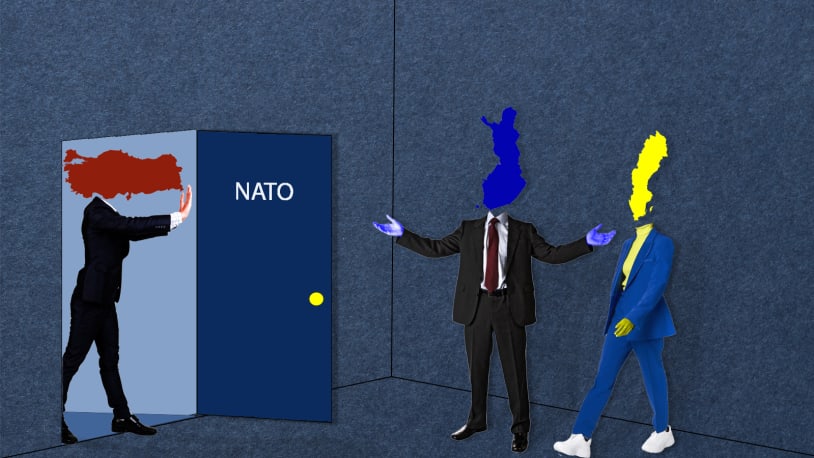
Why Turkey is blocking NATO expansion
The expansion of NATO is going … haltingly. Following Russia’s invasion of Ukraine, Sweden and Finland have applied to join the military alliance that includes the United States and much of Western Europe. But the process has hit a stumbling block. The Associated Press reports that Turkish President Recep Tayyip Erdogan this week said Sweden “can no longer expect any charity from us regarding their NATO membership application” after right-wing protesters burned a Koran outside the Turkish embassy in Stockholm. Finland’s foreign minister followed that by suggesting his country could join the alliance without Sweden if necessary. Why is Turkey opposed to NATO expansion? And how might this affect the war in Europe? Here’s everything you need to know:
Why do Finland and Sweden want to join NATO?
One word: Russia. Finland shares a long border with Russia, and Sweden sits on the Baltic Sea where much of the Russian Navy operates. But both were longtime holdouts against joining the military alliance — they were officially neutral throughout the Cold War — until Russian President Vladimir Putin decided to invade another neighbor, Ukraine, in 2022. “Public support for NATO membership in the Nordic countries shot up virtually overnight after the start of the invasion,” Axios reports. The two countries jointly applied for membership in May 2022. “Everything has changed when Russia attacked Ukraine,” Finnish Prime Minister Sanna Marin said at the time. “And I personally think that we cannot trust anymore there will be a peaceful future next to Russia.”
What’s the holdup?
NATO can’t add new countries without approval from the government of every single country in the alliance. That wasn’t a big deal when NATO had just 12 members, but now there are 30 countries in the organization. (In the United States, that requirement means two-thirds of the Senate must approve such applications: That happened by a 95-1 vote in August.) That means any single country can slow down the process if it chooses. “Joining NATO was never meant to be this hard, but because the alliance is now so big it just complicates things because you have to get 30 different leaders lined up and on the same page and 30 different legislatures lined up on the same page,” The Atlantic Council’s Christopher Skaluba tells The Hill.
Who are the holdouts?
Turkey and Hungary, but Hungary is expected to approve the applications this year. Erdogan, meanwhile, wants Sweden to “do more to tackle terrorist support among a Kurdish population of about 100,000, and to extradite suspects,” Bloomberg reports. The Financial Times adds that Turkey wants Sweden to cut ties with Kurdish People’s Protection Units (YPG) — a Kurdish militia that led the campaign against ISIS in Syria, but which also has ties to the Kurdistan Workers’ party (PKK) that has waged an insurgency against Turkey since 1980. Sweden has tried to “distance itself” from the offending group, Reuters reports. (And it has also lifted an arms embargo against Turkey.). But it hasn’t extradited the suspects that Turkey seeks.
What is the U.S. doing?
The United States, of course, is first among equals in the NATO alliance — so you would expect American leaders to push Turkey toward approving Sweden and Finland’s applications. Indeed, U.S. and Turkish officials met in mid-January to discuss both NATO and other “defense cooperation” topics. EuroNews reports that Turkey made clear that it wants to upgrade its fleet of U.S.-made F-16 jet fighters. But Voice of America says complying with that request might not be so simple: Congress has to approve the sale of fighters to Turkey — and NATO expansion won’t be the only condition of approval. The U.S. also wants a promise that Turkey won’t take military action in northern Syria. In other words: It’s complicated.
How does this affect the war in Ukraine?
Bloomberg‘s editors say the holdup “puts Europe’s wider security at risk.” Both countries have “considerable” defense capabilities that could come in useful “at a time when the alliance’s resources are stretched from assisting Ukraine.” But Russian leaders seem to think that — despite the slow process — the addition of Finland and Sweden is a done deal: Valery Gerasimov, the top Russian general in Ukraine, says planned reforms to the military include the ability to respond to threats posed by “the aspirations of the North Atlantic Alliance to expand to Finland and Sweden.”
What’s next?
The future is still muddy. Pekka Haavisto, the Finnish foreign minister, reportedly “backpedaled” after suggesting his country might join NATO without Sweden at its side — though The Associated Press notes it was the first time an official in either country had “raised doubts” about joining the alliance together. A resolution might not be in the offing for a while yet: The Wall Street Journal reports that Turkey won’t officially take up approval of NATO expansion until its national elections, most likely in May.
The expansion of NATO is going … haltingly. Following Russia’s invasion of Ukraine, Sweden and Finland have applied to join the military alliance that includes the United States and much of Western Europe. But the process has hit a stumbling block. The Associated Press reports that Turkish President Recep Tayyip Erdogan this week said Sweden…
The expansion of NATO is going … haltingly. Following Russia’s invasion of Ukraine, Sweden and Finland have applied to join the military alliance that includes the United States and much of Western Europe. But the process has hit a stumbling block. The Associated Press reports that Turkish President Recep Tayyip Erdogan this week said Sweden…